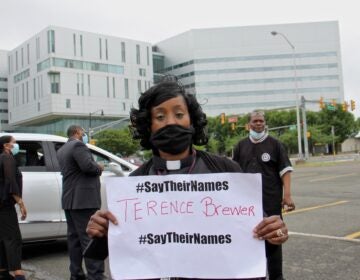Despite some releases, N.J. has highest COVID-19 prison death rate in the nation
More than 40 people in state custody have died of COVID-19, which is the highest in the nation as a share of prison population.

Prisoners make clothing for the New Jersey Department of Corrections. (Emma Lee/WHYY)
Are you on the front lines of the coronavirus? Help us report on the pandemic.
New Jersey prisoners are dying of COVID-19 at a higher rate than in any other state, but advocates say the administration of Gov. Phil Murphy has released just a small fraction of those eligible for home confinement under an executive order he signed more than a month ago.
Rory Price, 39, was a victim of that delay, his mother Bernice Ferguson said Thursday. Two weeks shy of his scheduled release date from a South Jersey halfway house, Price was exactly the type of person Murphy’s executive order was meant to help: prisoners who are older, have underlying medical conditions or who are approaching the end of their sentence.
Instead, Ferguson got a call that her son was in the hospital. He later died of COVID-19.
“Sure, children make bad decisions. We all do,” Ferguson said. “But to take somebody’s life? That’s why they did. They stole my baby’s life.”
Ferguson spoke at a news conference hosted by the American Civil Liberties Union, the New Jersey Campaign for Alternatives to Isolated Confinement, and Salvation and Social Justice, which are calling for the Murphy administration to rapidly ramp up the release of juvenile and adult prisoners in the midst of the coronavirus pandemic.
The ACLU estimates fewer than 100 people have been released so far despite Murphy’s assertion April 10 that the state would release up to 1,000 “low-risk” prisoners to protect them from the virus. The total population of those in state custody is about 18,500.
The New Jersey Department of Corrections did not respond to a message seeking comment for this story. But at a news conference on Friday, Murphy’s chief counsel Matt Platkin said far more prisoners have been released.
Platkin said 368 prisoners have been released under executive order, while another 273 have been discharged from the state parole board’s residential community programs.
Asked about those figures, ACLU attorney Alex Shalom said they were difficult to verify because the Department of Corrections has “not been sufficiently transparent.”
Social distancing is particularly difficult in the close confines of correctional facilities. Nationally, nearly 5,000 people detained or incarcerated have been diagnosed with COVID-19, and more than 100 prisoners and staff members have died, according to a CDC report released last week.
In New Jersey, 38 prisoners have died, according to The Marshall Project, which is tracking deaths behind bars. That’s higher than every state except Michigan and Ohio, and by far the highest death rate in the nation when compared to prison populations.
The state’s own record-keeping put the death toll of those in state custody at 42 as of Wednesday.
If Murphy won’t follow through to the full extent of his executive order and release 1,000 prisoners, Rev. Charles Boyer, who leads the organization Salvation and Social Justice, said the governor should instead use his authority to grant clemency to elderly prisoners, those being held for drug offenses or parole violations, and those who have served “outrageously long prison terms.”
Boyer also proposed legislation that would knock a year off of every prisoner’s sentence. Such “COVID credits,” he said, would result in the immediate release of nearly 4,000 people.
Trena Parks said her brother Darrell was another victim of the state’s inaction. Darrell, in his 60s, was 29 years into a murder sentence when he contracted COVID-19 at New Jersey State Prison in Trenton and later passed away.
“I just can’t understand why when the CDC warned that this pandemic would run through the prison and the most vulnerable needed to be safeguarded, why no one thought to safeguard these individuals,” Parks said.
Editor’s note – This story has been updated to include comments from Murphy’s chief counsel made on Friday.
WHYY is your source for fact-based, in-depth journalism and information. As a nonprofit organization, we rely on financial support from readers like you. Please give today.



![CoronavirusPandemic_1024x512[1]](https://whyy.org/wp-content/uploads/2020/03/CoronavirusPandemic_1024x5121-300x150.jpg)



